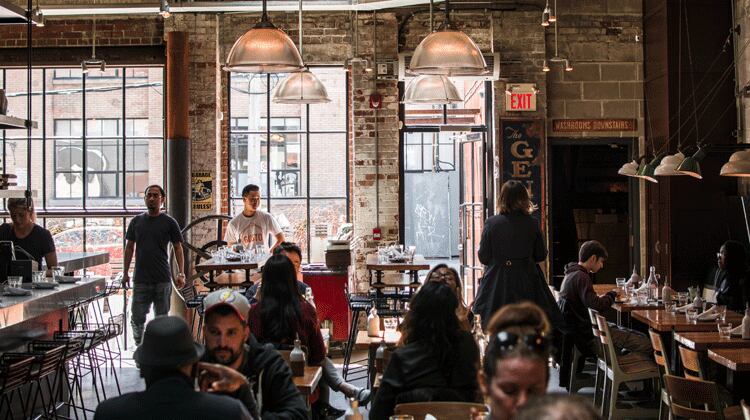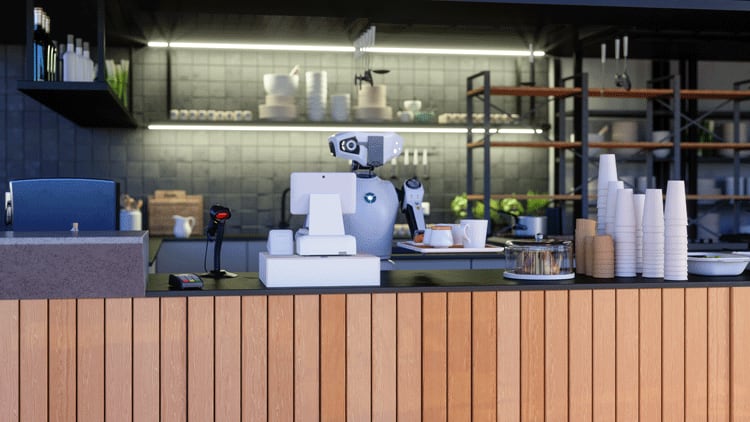From the BellaBot to the rise of ChatGPT, AI has become the latest buzzword in the industry. It has demonstrated its effectiveness in being able to create and analyse things that would take usually take humans days, in seconds. Whilst AI is often still met with some scepticism, with people fearing a ‘Terminator-style’ takeover of technology, it isn’t a new concept. From using facial recognition technology to unlock our iPhones, to fully automated cars - Al is already a fundamental part of our everyday lives.
When it comes to the hospitality, while the sector has started to embrace AI and automate some processes, uptake is slow. However, AI isn’t all about robot chefs. This technology can in fact, work in the background to help operators create better experiences for their customers without taking over the experience. We still need the human touch in hospitality, but using AI can save staff valuable time by streamlining processes and managing workflows, which leaves operators and staff with the headspace to focus on what they do best – delivering exceptional customer service.
1. Automating restaurant bookings and responses
Automation and AI is already used when it comes to bookings in hospitality. Chatbots powered by AI can be used to provide customer support and answer frequently asked questions, as well as facilitate bookings. Not only can this help reduce the workload on staff, but it provides 24/7 support to customers. Being communicative with customers is vital in driving brand loyalty and repeat visits.
Voice Assistants are similar to chat bots and use AI, however the technique used is different. “Natural language processing” can answer and speak “like a human” and decipher complex conversations such as “Book me a table for two people, tomorrow, at half eight.” Again, this alleviates staff pressure by not having to spend time answering phones, ensuring they never miss a booking, and allowing staff to focus on more tasks, such as improving the overall customer experience in-venue. Zonal has had a long withstanding partnership with PolyAI to deliver this and this is something we can expect more of as the AI technology continues to improve.
2. Improved stock management
AI is already assisting in analysing and better managing suppliers and stock. That being said, it’s not enough for operators just to keep track of stored and delivered stock. AI can help businesses go one step further and forecast, plan, and control their stock. By leveraging these solutions, a business can minimise the possibility of overstocking and understocking. That’s because AI technology can analyse and correlate what products are selling well and detect and respond to consumer demand for a specific product, allowing operators to better manage stock and not over order. This same technology can collect data to track and report on food waste in venues. For example, some food waste AI management technology include AI-powered cameras, which takes images of the food going to waste. providing real-time feedback to kitchen staff, helping them to monitor portion size and improve efficiency to reduce waste.
What’s more, with the right tech in place, every time a sale goes through the POS, the stock management systems automatically deplete this from the stock take, providing businesses with real-time visibility of product availability. Over time, AI will distinguish patterns, so you know exactly how much stock needs ordering and when, speeding up the stock ordering process and, enabling venues to get the most accurate product levels possible – removing the risk of human error all together. Not only does this save operators vital funds, but it enables venues to reduce wastage as well and it can do all of this in seconds.
3. Forward planning and getting ahead
Instead of looking back at previous data (which hospitality business with tech are already collating) and making decisions based on this, AI can help operators take this data and predict trends and eventualities that could take place in the future.
Not only can AI be able to analyse previous data to help operators make strategic business decisions, but by analysing patterns in previous data, AI can predict common scenarios and inform restaurateurs so they can make the right decisions, such as on staffing and stocks based on this insight. For example, AI can analyse data such as bookings, the weather forecast and local events in milliseconds and more accurately than the human eye. This enables operators to get a detailed picture of how busy a restaurant may be that day, or that week, and then use this data to plan better, such as organising staff rotas to deal with potential demand. AI can then look back to this trading day and analyse data to work out whether a promotion was or wasn’t successful. This helps with planning moving forwards.
What this also enables operators to do is leverage this data to enhance the efficiency of their marketing efforts. If AI can predict both busy and quieter periods, operators can better target and engage customers through marketing, as well as offer relevant promotions, deals and offers to entice people to visit the venue. Where AI plays a role is helping operators to predict when these occasions will occur, allowing for better planning.
4. Hyper-personalising the customer experience
Not only can AI help businesses streamline operations, but it can help operators provide light touches of personalisation which in turn enhances the customer experience and drives return visits and loyalty. We know that 80% of customers are interested in some form of personalisation when visiting pubs, bars and restaurants, so using AI to help provide these experiences will be beneficial. Restaurants can use machine learning algorithms to analyse customers’ preferences and past orders to offer personalised recommendations. By looking at past orders, browsing history, and even customer service interactions, AI can identify patterns that help to build a comprehensive picture of each individual customer. This analysis can then be used to suggest products or services that are most likely to meet their specific needs and interests.
5. Predictive maintenance
Moving forwards, AI may also be used to predict equipment failures and prevent downtime. This is particularly important in the hospitality industry, where a broken-down payment machine, oven or refrigeration unit can disrupt operations and cost the business money.
6. Facial Recognition
Looking ahead, there is a possibility that hospitality will be able to use face recognition technology to identify customers and their current sentiment. Such technology, when linked to a CRM could be used to offer regular customers something personal, such as ‘a glass of the usual’ or their ‘favourite spot by the window’ when they arrive. We could also see AI being used to understand how a customer is feeling whilst in the restaurant, if they look unhappy or if they’ve been waiting too long for their main meal, technology could prompt a staff visit to the table.
For more information about Zonal products and services click here.


